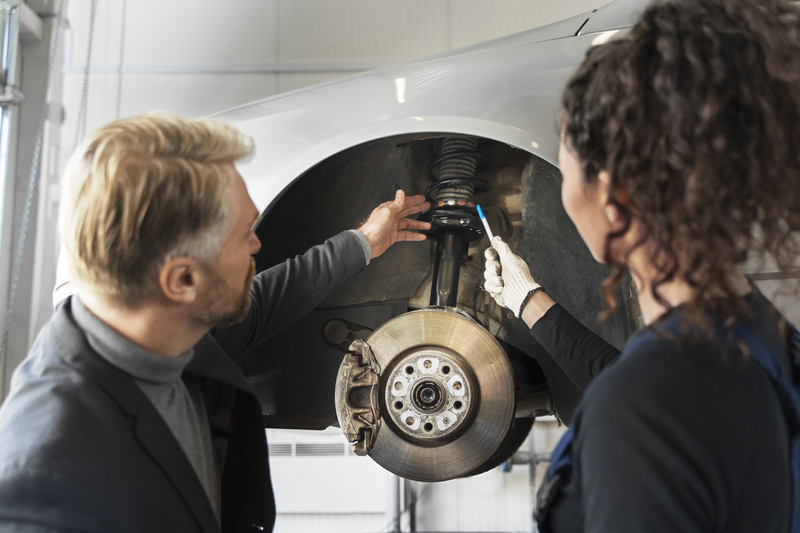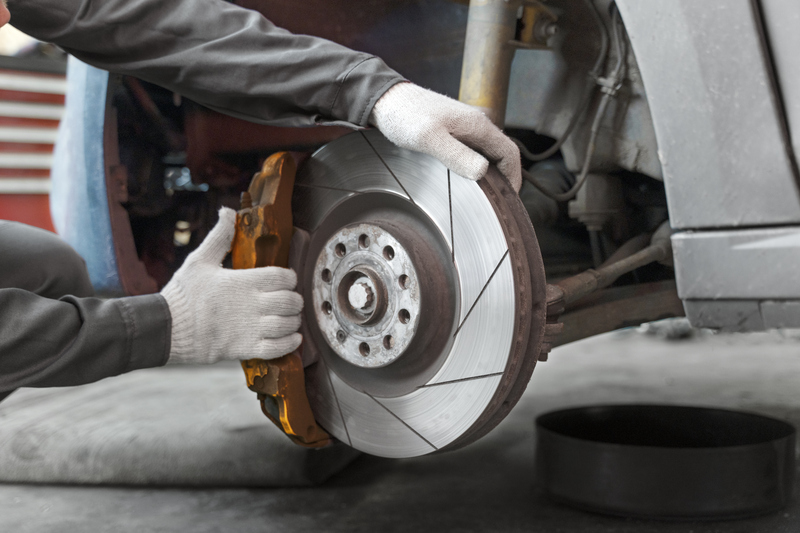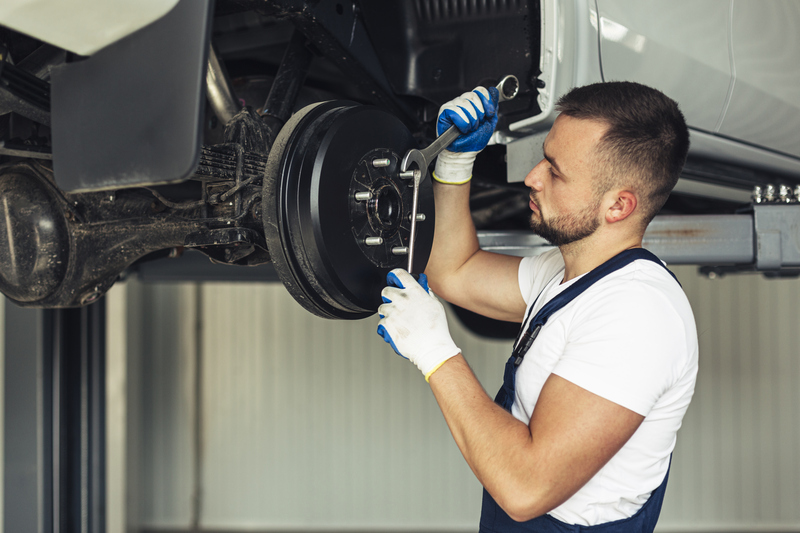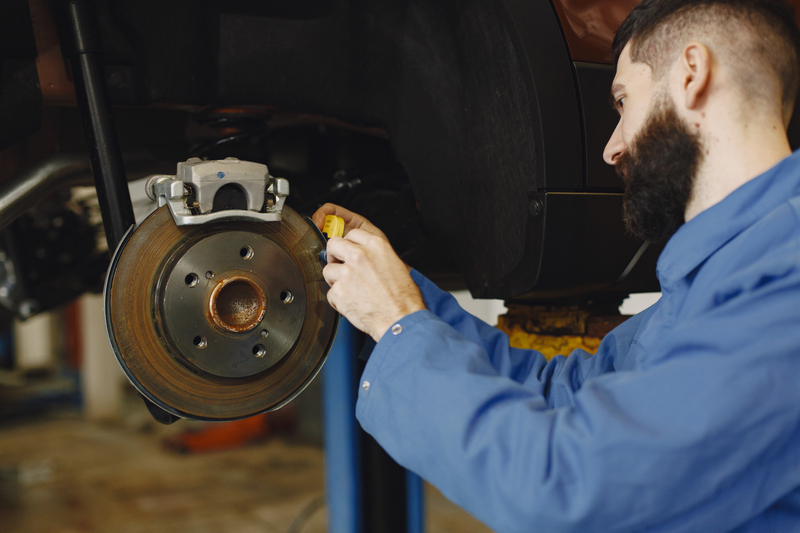| T O P I C R E V I E W |
| nickmitchell |
Posted - Dec 02 2023 : 02:43:32
Brake pads are a critical component of your car's braking system. They are designed to grip the brake rotor and slow down or stop your vehicle when you apply the brakes. Over time, brake pads wear down due to friction and need to be replaced. It is important to be aware of the signs that your car's brake pads are worn out to ensure your safety on the road.

Here are some common signs that indicate you may need to replace your car's brake pads:
Squeaking or squealing noises: If you hear high-pitched noises when you apply the brakes, it could be a sign that your brake pads are worn out. This noise is often caused by a metal wear indicator, which is designed to make a noise when it comes into contact with the rotor.
Grinding or scraping sounds: If you hear a grinding or scraping noise when you apply the brakes, it is a clear indication that your brake pads are completely worn out. In this case, the metal backing plate of the brake pad is grinding against the rotor, which can cause damage to both the pad and the rotor.
Reduced braking performance: If you notice that your car takes longer to come to a complete stop or requires more effort to brake, it could be a sign that your brake pads are worn out. Worn brake pads have reduced friction and cannot grip the rotor effectively, leading to poorer braking performance.
Vibrations or pulsations: When your brake pads are worn out, you may feel vibrations or pulsations in the brake pedal when you apply pressure. This can indicate that the brake pads are not making proper contact with the rotor, resulting in an uneven braking experience.
Dashboard warning light: Many modern vehicles are equipped with a dashboard warning light that is designed to alert you when your brake pads are worn out. If this warning light illuminates, it is important to have your brake pads checked and replaced if necessary.
How to Know When to Replace Brake Pads:

Knowing when to replace your car's brake pads is essential for maintaining optimal braking performance and ensuring your safety on the road. Here are some key indicators that can help you determine when it's time to replace your brake pads:
Thickness of the brake pads: Most brake pads have a minimum thickness specified by the manufacturer. You can visually inspect your brake pads or have them checked by a professional to ensure they meet the minimum thickness requirements. If the brake pads are too thin, they need to be replaced.
Visible signs of wear: Examine the surface of the brake pads for any signs of wear. If you notice significant grooving, cracking, or uneven wear, it is a clear indication that the brake pads are worn out and should be replaced.
Brake pad warning indicators: Some brake pads come with built-in wear indicators, such as metal tabs or grooves, that become exposed when the pads wear down. If you see these indicators, it means your brake pads are due for replacement.
Mileage and driving conditions: The lifespan of brake pads can vary depending on your driving style and conditions. If you frequently drive in stop-and-go traffic or make sudden stops, your brake pads may wear out faster. Additionally, if you have reached the recommended mileage for brake pad replacement, it is a good idea to have them inspected and replaced if necessary.
It is important to note that the signs and indicators mentioned above are general guidelines. Always consult your vehicle's owner manual or seek professional advice for specific recommendations regarding your car's brake pads.
When to Change Brake Pads:

The timing for brake pad replacement can vary depending on various factors, such as driving habits, type of vehicle, and the quality of brake pads used. However, as a general rule of thumb, it is recommended to have your brake pads inspected at least once a year or every 12,000 to 15,000 miles.
If you notice any of the signs mentioned earlier or if your brake pads have reached the minimum thickness specified by the manufacturer, it is important to change them promptly. Delaying brake pad replacement can lead to further damage to the braking system, including the rotors, calipers, and brake lines.
Regular maintenance and inspection of your brake pads can help prevent costly repairs and ensure your safety on the road. If you are unsure about the condition of your brake pads, it is always best to consult with a qualified mechanic or schedule a service appointment with a trusted automotive shop.
Car Brake Pads Replacement:

Replacing your car's brake pads is an important maintenance task that should be done properly to ensure the optimal performance of your vehicle's braking system. While it is always recommended to have a professional mechanic perform this task, if you have the necessary knowledge and tools, you can replace the brake pads yourself.
Here is a general step-by-step guide on how to replace your car's brake pads:
Prepare the necessary tools and materials: To replace your brake pads, you will need a jack or lift, lug wrench, C-clamp or brake caliper piston tool, brake cleaner, high-temperature grease, new brake pads, and potentially new brake hardware.
Safely lift and support the vehicle: Before starting any work, ensure you follow proper safety procedures. Use the jack or lift to elevate your vehicle and secure it with jack stands. This will provide you with enough space to access the brake calipers and pads.
Remove the wheel and caliper: Use a lug wrench to loosen the lug nuts and remove the wheel. Then, remove the brake caliper by loosening the bolts or pins that secure it to the brake rotor. Be careful not to damage the brake line.
Replace the brake pads: Once the caliper is removed, you can access the brake pads. Take note of the orientation of the old brake pads and carefully remove them. Install the new brake pads using any necessary clips or hardware included with the pads.
Reinstall the caliper and wheel: Before reinstalling the caliper, ensure the brake piston is fully retracted using a C-clamp or brake caliper piston tool. This will allow enough space for the new, thicker brake pads. Once the caliper is back in place, tighten the bolts or pins. Then, reinstall the wheel and tighten the lug nuts.
Repeat the process for the other wheels: Brake pads should always be replaced in pairs, so repeat the above steps for the remaining wheels.
Test the newly replaced brake pads: After replacing all the brake pads, lower the vehicle and test the brakes before driving. Pump the brake pedal a few times to ensure the pads make proper contact with the rotors.
Brake Pads Replacement:

Brake pads replacement is a crucial part of regular vehicle maintenance that should not be overlooked. By understanding the signs of worn-out brake pads and knowing when to replace them, you can ensure the safety and reliability of your car's braking system.
If you are unsure about the condition of your brake pads, it is always recommended to consult with a professional mechanic. These experts have the knowledge and experience to properly diagnose any issues with your brake pads and perform the necessary replacements or repairs.
Remember, your brakes are one of the most important safety features in your car. Don't take any chances when it comes to the condition of your brake pads. Stay vigilant, be aware of the signs of wear, and take prompt action to replace your brake pads when needed.
How Service My Car Assists You?
Have you reached a point where you're questioning, "Where can I find the top garage in Bolon for my car?" Look no further. At Service My Car, we provide premium car servicing, repair, and maintenance services, always within your reach. With specialized service offerings for the car and comprehensive service packages, we ensure the collection and drop-off of your vehicle following its maintenance.
nick |
|
|

